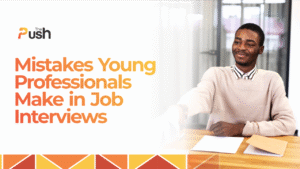For many young professionals, it’s the first real test of how well their skills, confidence, and personality align with the world of work. But being qualified isn’t always enough. How you present yourself can make or break the outcome.
Let’s break down the most common mistakes young professionals make during interviews and how to do better.

1. Not Researching the Company Enough
A lot of candidates make the mistake of showing up without knowing more than the basics. Employers can tell when you’ve only skimmed their website. What they’re looking for is genuine interest: someone who understands their culture, values, and current projects. Doing your homework shows that you’re intentional and serious about the role, not just applying blindly.
2. Talking Only About Personal Goals
Young professionals often focus too much on what they want: higher pay, career growth, or exposure. While ambition is important, interviews are about alignment. Employers want to hear how your skills can solve their problems and help their business grow. Framing your answers around both your goals and the company’s needs makes you stand out.
3. Giving Unclear Answers
Nervousness can lead to long, unstructured answers that lose focus. Interviewers aren’t just listening for what you say, they’re also paying attention to how clearly you say it. Preparing short, structured stories about your experiences helps you communicate with clarity and confidence.

4. Downplaying Achievements
Many young professionals don’t want to sound boastful, so they undersell their achievements. The problem is that interviewers walk away unsure of what you’ve actually accomplished. You don’t need to exaggerate; just use numbers, outcomes, and examples to show the real impact of your work.
5. Missing the Chance to Ask Questions
When asked, “Do you have any questions for us?”, too many candidates freeze or say “no.” This moment is your chance to shine. Asking thoughtful questions shows you’re curious, invested, and thinking about the bigger picture of how you’ll fit into the company.
6. Forgetting the Follow-Up
The interview isn’t over when you walk out. A thank-you note or email can leave a lasting impression. It shows professionalism, gratitude, and genuine interest, qualities employers notice. Sometimes, it’s this small gesture that tips the scales in your favor.

Job interviews are about preparation, awareness, and connection. Every mistake is a lesson, and every lesson makes you sharper for the next opportunity. With the right approach, even rejection becomes redirection toward something better.
So, next time you sit across from an interviewer, remember: you’re not just answering questions, you’re telling your story, and how well you tell it can change everything.





